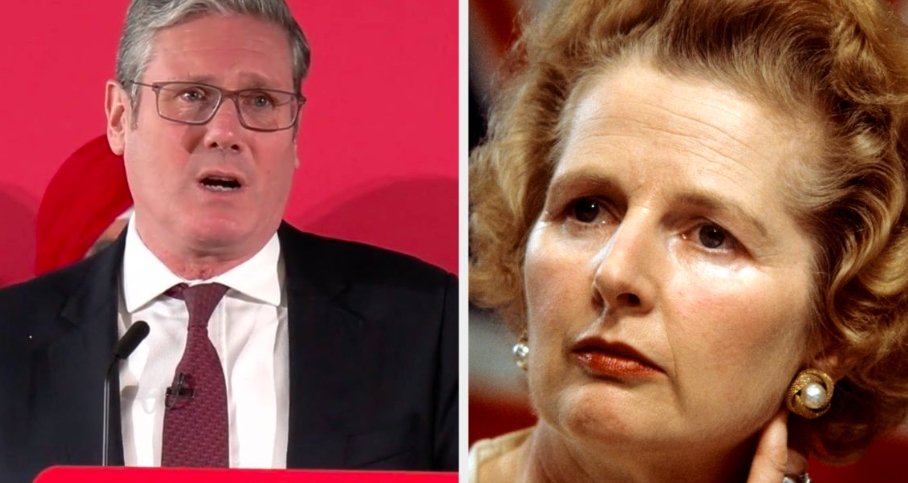SNP slams Labour leader for praising former Tory PM
The leader of the Labour Party, Keir Starmer, has faced criticism from the Scottish National Party (SNP) for quoting and praising Margaret Thatcher in a speech on crime. Starmer said that Thatcher was “right” about the rule of law being the “first duty of government” in a speech at Port Vale FC in Burslem on Wednesday. He was unveiling Labour’s “mission to halve serious violent crime and raise confidence in the police and criminal justice system” .
Mhairi Black, the SNP’s depute leader at Westminster, said that Starmer’s comments showed that his Labour party was lurching to the right and that people in Scotland would be appalled by his admiration for Thatcher, who left “lasting scars” on Scottish communities. Black said: “Under Starmer, the pro-Brexit Labour Party has lurched to the right, and is now little more than a pound-shop Tory tribute act – copying Tory policies and quoting Tory prime ministers. Whether it’s denying Scotland’s democracy, ruling out any return to the EU, backing Tory cuts to public sector pay and benefits, attacking migration, or signalling greater privatisation of the NHS – the Labour Party has become a pale imitation of the Tories. With no change on offer at Westminster, it’s clear independence is the only way to deliver real change and build the strong, fair and prosperous future Scotland deserves.”
Starmer defends his stance on crime and justice
Starmer defended his speech and said that he was not afraid to talk about crime and justice, which he said were “Labour issues”. He said that he wanted to restore trust in the police and the courts, which he claimed had been eroded by Tory cuts and mismanagement. He also said that he wanted to tackle the root causes of crime, such as poverty, inequality and lack of opportunity. He said: “I’m not going to shy away from talking about these issues because they matter. They matter to the British people, they matter to our communities and they matter to me. I’ve spent my life fighting for justice, standing up for the powerless and against the powerful. As Director of Public Prosecutions, I saw first-hand the impact of crime on victims and their families. I also saw the consequences of failing to prevent crime and to rehabilitate offenders.”

Starmer also outlined some of the policies that Labour would implement if it came to power, such as:
- Recruiting 5,000 new community support officers to work with the police and local communities
- Establishing a new victims’ law to guarantee the rights and support of victims of crime
- Creating a new national strategy to combat violence against women and girls
- Investing in youth services and early intervention programmes to divert young people away from crime
- Reforming the probation service and expanding the use of problem-solving courts
- Introducing a new public health duty to prevent serious violence and knife crime
Starmer faces challenges from within and outside his party
Starmer’s speech on crime and justice comes at a time when he is facing challenges from both within and outside his party. He has been accused of lacking vision and direction by some of his critics, who say that he has failed to offer a clear alternative to the Tory government. He has also faced pressure from some of his MPs and members to adopt a more pro-EU stance and to support a second referendum on Scottish independence. He has also faced criticism from some of the trade unions that fund his party, who say that he has not done enough to defend workers’ rights and interests
On the other hand, Starmer has also faced competition from other parties, such as the SNP in Scotland, the Liberal Democrats in England and Wales, and the Greens across the UK. He has struggled to make an impact in the opinion polls, which show that the Tories still have a comfortable lead over Labour. He has also failed to win any of the recent by-elections, losing the Hartlepool seat to the Tories and coming fourth in Chesham and Amersham, where the Lib Dems took the seat from the Tories. He has also faced the challenge of dealing with the Covid-19 pandemic, which has dominated the political agenda and given the government an advantage in terms of media coverage and public support
Starmer has said that he is determined to lead Labour to victory in the next general election, which is due by 2025. He has said that he will set out his vision for the country in the coming months and that he will focus on the issues that matter to the people, such as the economy, health, education and the environment. He has also said that he will hold the government to account for its failures and scandals, such as the mishandling of the pandemic, the corruption and cronyism in the awarding of contracts, and the breaking of international law over Brexit. He has said that he will offer a “new leadership” that will restore trust and confidence in politics and that will deliver “real change” for the country


















